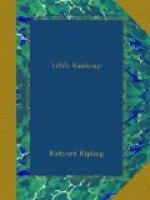‘Wot’s the use o’ worritin’ ‘bout these things?’ said Ortheris. ’You’re bound to find all out quicker nor you want to, any’ow.’ He jerked the cartridge out of the breech-block into the palm of his hand. ’’Ere’s my chaplain,’ he said, and made the venomous black-headed bullet bow like a marionette. ‘’E’s goin’ to teach a man all about which is which, an’ wot’s true, after all, before sundown. But wot ’appened after that, Jock?’
‘There was one thing they boggled at, and almost shut th’ gate i’ my face for, and that were my dog Blast, th’ only one saved out o’ a litter o’ pups as was blowed up when a keg o’ minin’ powder loosed off in th’ store-keeper’s hut. They liked his name no better than his business, which were fightin’ every dog he comed across; a rare good dog, wi’ spots o’ black and pink on his face, one ear gone, and lame o’ one side wi’ being driven in a basket through an iron roof, a matter of half a mile.
’They said I mun give him up ’cause he were worldly and low; and would I let mysen be shut out of heaven for the sake on a dog? “Nay,” says I, “if th’ door isn’t wide enough for th’ pair on us, we’ll stop outside, for we’ll none be parted.” And th’ preacher spoke up for Blast, as had a likin’ for him from th’ first—I reckon that was why I come to like th’ preacher—and wouldn’t hear o’ changin’ his name to Bless, as some o’ them wanted. So th’ pair on us became reg’lar chapel-members. But it’s hard for a young chap o’ my build to cut traces from the world, th’ flesh, an’ the devil all uv a heap. Yet I stuck to it for a long time, while th’ lads as used to stand about th’ town-end an’ lean ower th’ bridge, spittin’ into th’ beck o’ a Sunday, would call after me, “Sitha, Learoyd, when’s ta bean to preach, ‘cause we’re comin’ to hear tha.”— “Ho’d tha jaw. He hasn’t getten th’ white choaker on ta morn,” another lad would say, and I had to double my fists hard i’ th’ bottom of my Sunday coat, and say to mysen, “If ’twere Monday and I warn’t a member o’ the Primitive Methodists, I’d leather all th’ lot of yond’.” That was th’ hardest of all—to know that I could fight and I mustn’t fight.’
Sympathetic grunts from Mulvaney.
‘So what wi’ singin’, practising and class-meetin’s, and th’ big fiddle, as he made me take between my knees, I spent a deal o’ time i’ Jesse Roantree’s house-place. But often as I was there, th’ preacher fared to me to go oftener, and both th’ old man an’ th’ young woman were pleased to have him. He lived i’ Pately Brig, as were a goodish step off, but he come. He come all the same. I liked him as well or better as any man I’d ever seen i’ one way, and yet I hated him wi’ all my heart i’ t’other, and we watched each other like cat and mouse, but civil as you please, for I was on my best behaviour, and he was that fair and open that I was bound to be fair with him. Rare good company he was, if I hadn’t wanted to wring his cliver little neck half of the time. Often and often when he was goin’ from Jesse’s I’d set him a bit on the road.’




